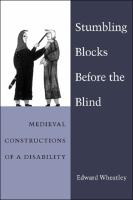Stumbling Blocks Before the Blind
External Review of Whole Manuscript
Medieval Constructions of a Disability
Author(s)
Wheatley, Edward
Collection
Knowledge Unlatched (KU)Language
EnglishAbstract
Bold, deeply learned, and important, offering a provocative thesis that is worked out through legal and archival materials and in subtle and original readings of literary texts. Absolutely new in content and significantly innovative in methodology and argument, Stumbling Blocks Before the Blind offers a cultural geography of medieval blindness that invites us to be more discriminating about how we think of geographies of disability today." ---Christopher Baswell, Columbia University "A challenging, interesting, and timely book that is also very well written . . . Wheatley has researched and brought together a leitmotiv that I never would have guessed was so pervasive, so intriguing, so worthy of a book." ---Jody Enders, University of California, Santa Barbara Stumbling Blocks Before the Blind presents the first comprehensive exploration of a disability in the Middle Ages, drawing on the literature, history, art history, and religious discourse of England and France. It relates current theories of disability to the cultural and institutional constructions of blindness in the eleventh through fifteenth centuries, examining the surprising differences in the treatment of blind people and the responses to blindness in these two countries. The book shows that pernicious attitudes about blindness were partially offset by innovations and ameliorations---social; literary; and, to an extent, medical---that began to foster a fuller understanding and acceptance of blindness. A number of practices and institutions in France, both positive and negative---blinding as punishment, the foundation of hospices for the blind, and some medical treatment---resulted in not only attitudes that commodified human sight but also inhumane satire against the blind in French literature, both secular and religious. Anglo-Saxon and later medieval England differed markedly in all three of these areas, and the less prominent position of blind people in society resulted in noticeably fewer cruel representations in literature. This book will interest students of literature, history, art history, and religion because it will provide clear contexts for considering any medieval artifact relating to blindness---a literary text, a historical document, a theological treatise, or a work of art. For some readers, the book will serve as an introduction to the field of disability studies, an area of increasing interest both within and outside of the academy. Edward Wheatley is Surtz Professor of Medieval Literature at Loyola University, Chicago.
Keywords
Blind -- France -- History -- To 1500.;Blind -- Great Britain -- History -- To 1500.;Disability studies.DOI
10.3998/mpub.915892ISBN
9780472117208, 9780472120857, 9780472903801, 978047203801Publisher
University of Michigan PressPublisher website
https://www.press.umich.edu/Publication date and place
2010Grantor
Series
Corporealities: Discourses Of Disability,Classification
History
European history
Disability: social aspects


 Download
Download Download
Download Web Shop
Web Shop